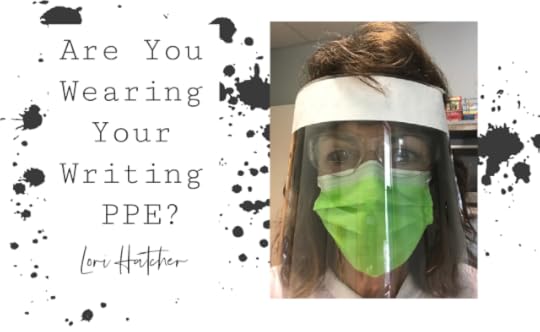Are You Wearing Your Writing PPE?

by Lori Hatcher @LoriHatcher2
Before COVID-19, most people had never heard the term PPE (Personal Protective Equipment). Now PPE has become part of our everyday vernacular. I’m a dental hygienist who has worn PPE for 35 years, but COVID-19 has taken the concept of personal protection to a whole new level.
Medical and dental professionals aren’t the only ones who need to wear PPE. Writers should, too. Let me explain.A Writer's PPE
The first piece of PPE I put on is my lab coat. Made of water-resistant material, my coat is the first line of defense against spray, splatter, and splashes. Its special fabric protects my skin from contaminants and causes liquid to bead up and roll off instead of soaking in.
Writers need a similar coat to protect their skin. Although our skin toughens up the longer we navigate the publishing world, we never become fully immune to caustic comments, painful rejections, and negative reviews from readers, editors, and colleagues.
The best writing lab coats are reinforced with God’s Word. When we clothe ourselves in truth , dangerous and damaging words are more likely to roll off us. Seeing the world through the filter of Scripture toughens our skin and makes us less vulnerable to attack.
After I button up my lab coat, I slip on a pair of goggles. My goggles serve two purposes—magnification and protection. Special lenses bring tiny objects like premolars into sharper focus, enabling me to see more clearly. The goggles’ wrap-around design prevents debris from flying into my eyes.
A writer’s goggles can do the same.
Wise mentors, critique groups, classes, and conferences provide the magnification we need to see our writing clearly. They enable us to spot what needs to be fixed and celebrate what works well. They sharpen our focus and hone our message.
The Psalmist (who was a writer, by the way) used a pair of spiritual goggles to protect his eyes from harm. “Turn my eyes from looking at worthless things,” he prayed (Psalm 119:37 ESV).
Worthless things for a writer include gazing at others’ success, staring at our social media numbers, and becoming distracted by everything that whizzes by in the writing world. Proverbs 4:25 is a prayer prescription for the easily distracted: “Let your eyes look directly ahead and let your gaze be fixed straight in front of you.”
After I slip on my goggles, I cover my mouth and nose with a mask. The mask’s three layers of filtration protect my patient from anything harmful lurking in my respiratory system.
Writers benefit from wearing a three-layer mask, too. Because we never, ever want to harm a reader with something we’ve written, we can pray Psalm 141:3, the first layer of filtration: “Set a guard over my mouth, LORD; keep watch over the door of my lips [and my pen].” If you wouldn’t say it, you certainly shouldn’t write it.
Ephesians 4:15 provides the second layer: “Speaking the truth in love.”
Ephesians 4:29 supplies the third: “Do not let any unwholesome talk come out of your mouths [or your computers], but only what is helpful for building others up according to their needs, that it may benefit those who listen.”
The final component of my dental hygiene PPE is my shield. It protects me from toxic elements in the air around me. Some of the procedures I perform launch germs, viruses, aerosols, and debris into the air. My shield acts as a physical barrier between me and my patient.
A writer’s shield is the shield of faith (Ephesians 6:16). With faith, we can “quench all the fiery darts of the wicked one.” When we seek God’s direction and inspiration before we write a blog post, article, short story, or chapter, we invite the Holy Spirit to lead and guide our words.
God knows who will read our work, what their needs are, and what He plans to accomplish in their lives through our writing. If we pick up our pens without consulting God, we act presumptuously.
“Without faith,” Hebrews 11:6 reminds us, “it is impossible to please God.” To please God with our writing, we must approach every project fully surrendered to His will and purposes.
I’d never dream of caring for a patient without my PPE on—for their sake and for mine. Christian writers should never approach our writing without our PPE. With our spiritual lab coat, goggles, mask, and shield, we can “be strong in the Lord and in his mighty power. Put on the full armor [PPE] of God, so that you can take your stand against the devil’s schemes” (Ephesians 6:10-11).
May God lead, guide, use, and protect you as you write for Him.
TWEETABLEAre You Wearing Your Writing PPE? - insight from @LoriHatcher2 on @EdieMelson (Click to Tweet)
 Lori Hatcher loves to teach, train, and encourage writers by sharing what others have generously shared with her. She’s the author of several devotional books including
Refresh Your Faith – Uncommon Devotions from Every Book of the Bible
and
Hungry for God … Starving for Time, Five-Minute Devotions for Busy Women
, the 2016 Christian Small Publisher Book of the Year. The editor of
Reach Out, Columbia
magazine, she’s also a blogger, writing instructor, and inspirational speaker. You’ll find her pondering the marvelous and the mundane on her blog, Hungry for God. . . Starving for Time . Connect with her on Facebook, Twitter (@LoriHatcher2), or Pinterest (Hungry for God).
Lori Hatcher loves to teach, train, and encourage writers by sharing what others have generously shared with her. She’s the author of several devotional books including
Refresh Your Faith – Uncommon Devotions from Every Book of the Bible
and
Hungry for God … Starving for Time, Five-Minute Devotions for Busy Women
, the 2016 Christian Small Publisher Book of the Year. The editor of
Reach Out, Columbia
magazine, she’s also a blogger, writing instructor, and inspirational speaker. You’ll find her pondering the marvelous and the mundane on her blog, Hungry for God. . . Starving for Time . Connect with her on Facebook, Twitter (@LoriHatcher2), or Pinterest (Hungry for God).
Published on July 23, 2020 22:00
No comments have been added yet.



